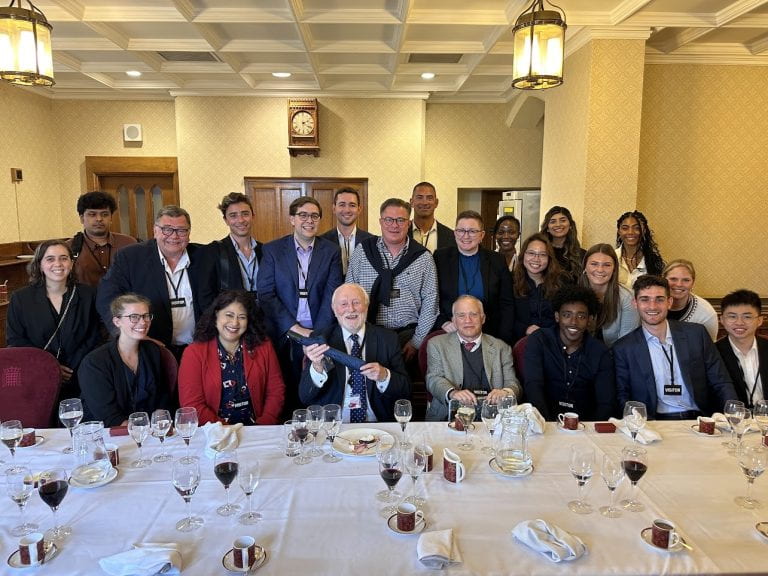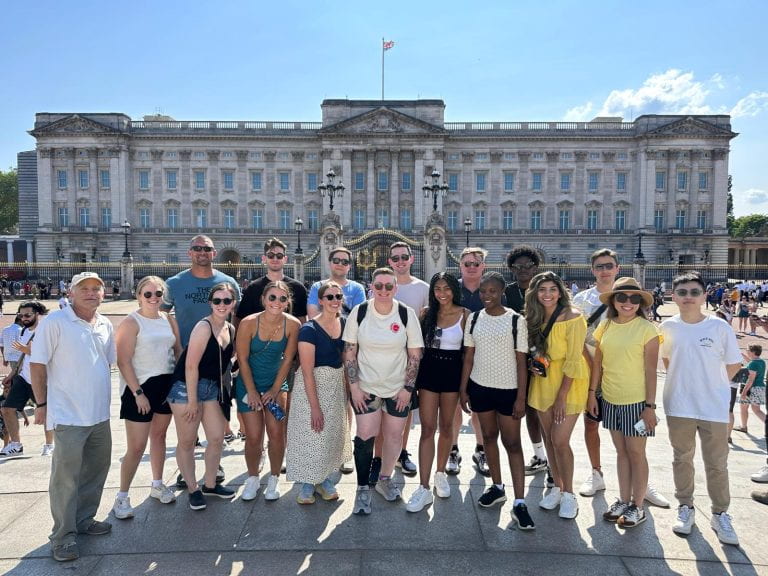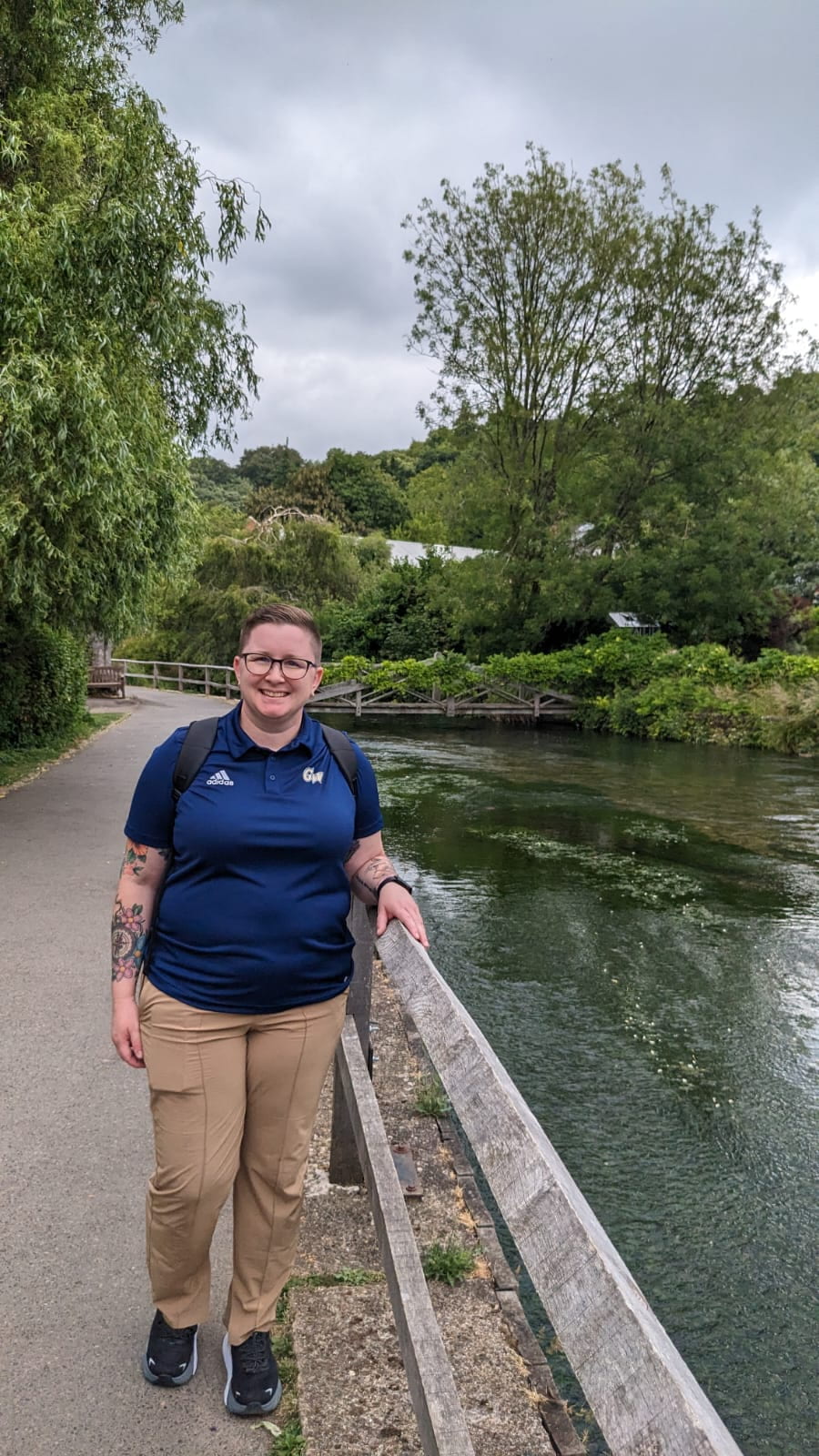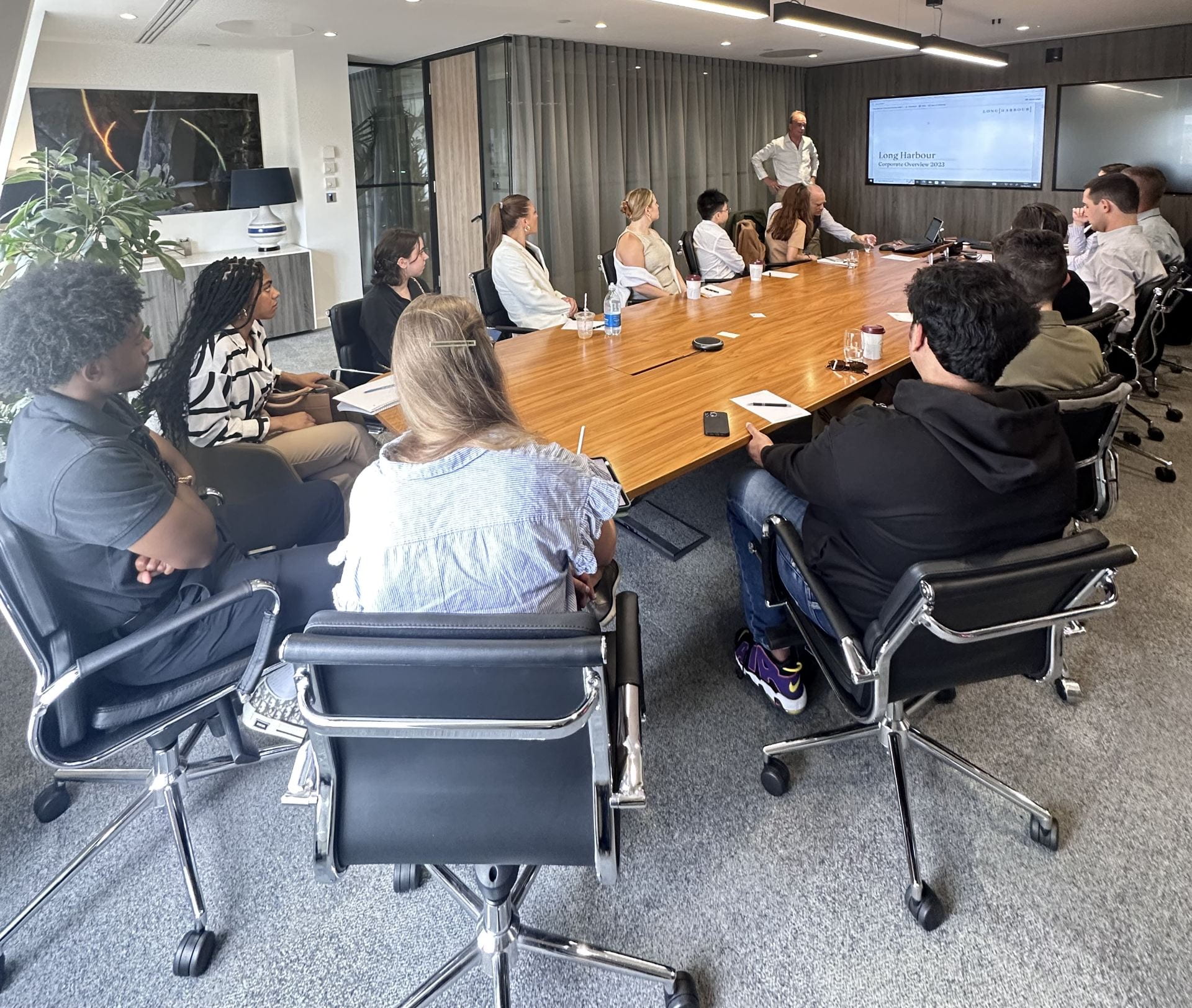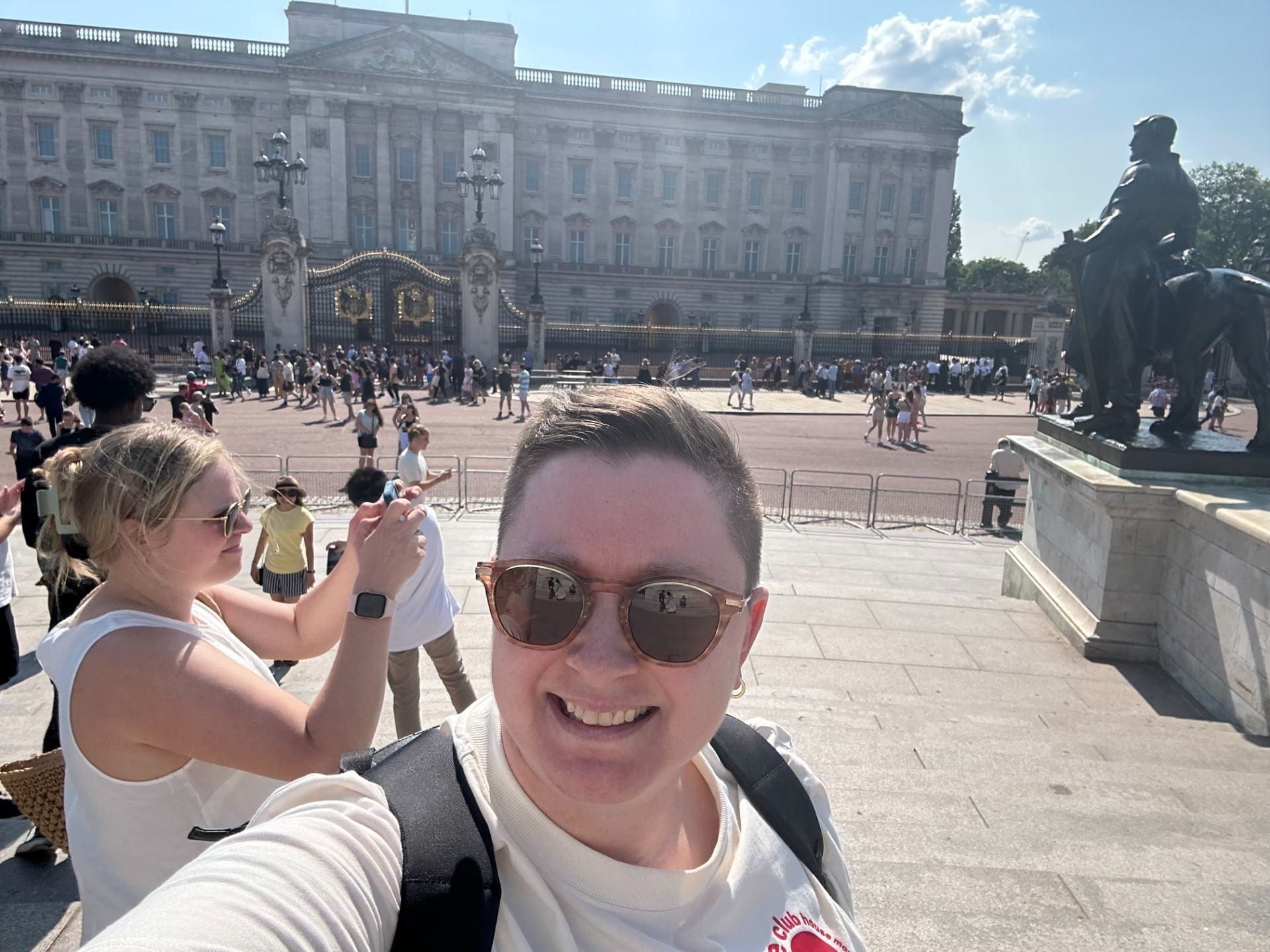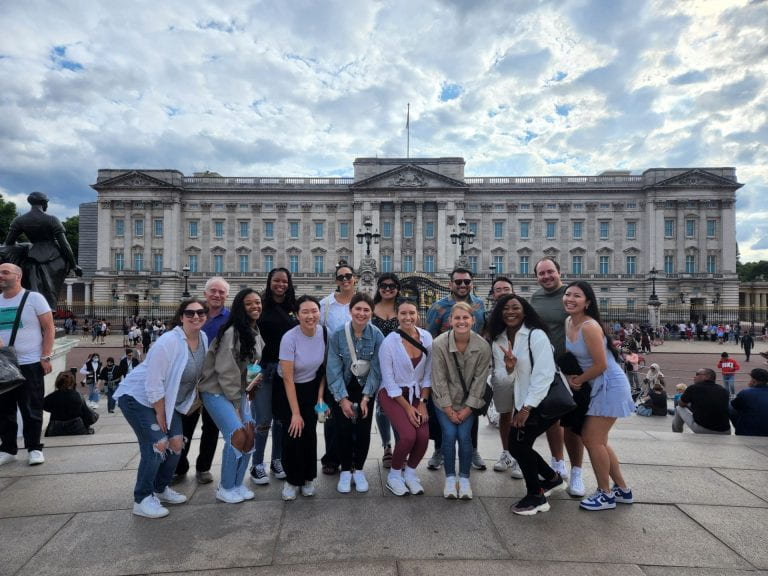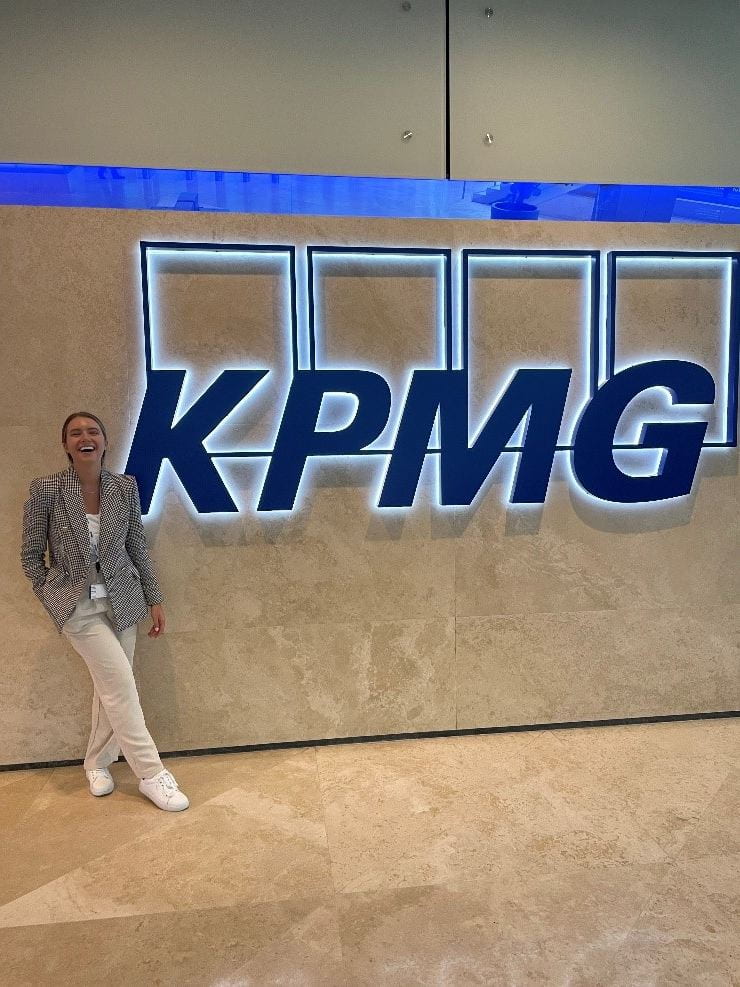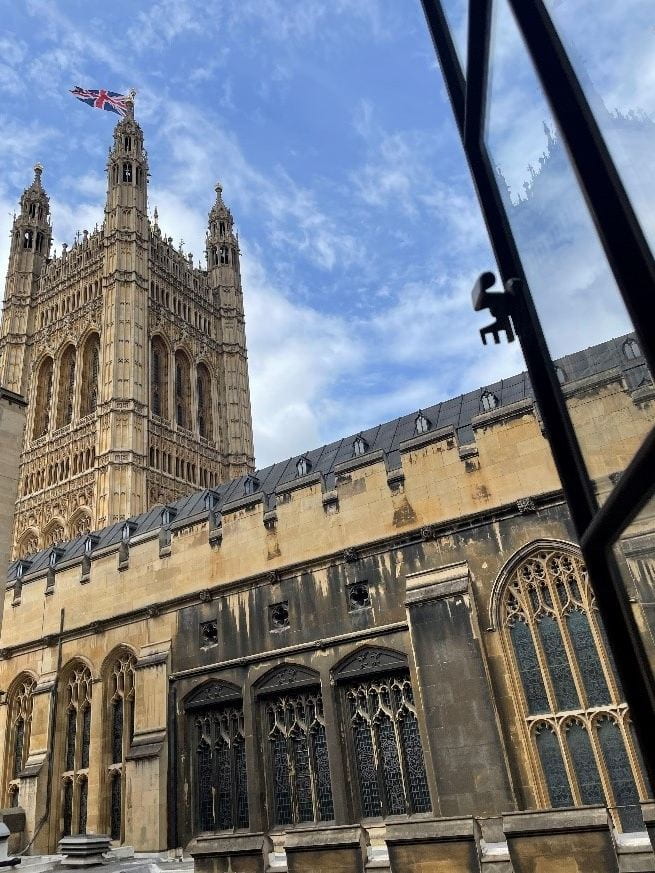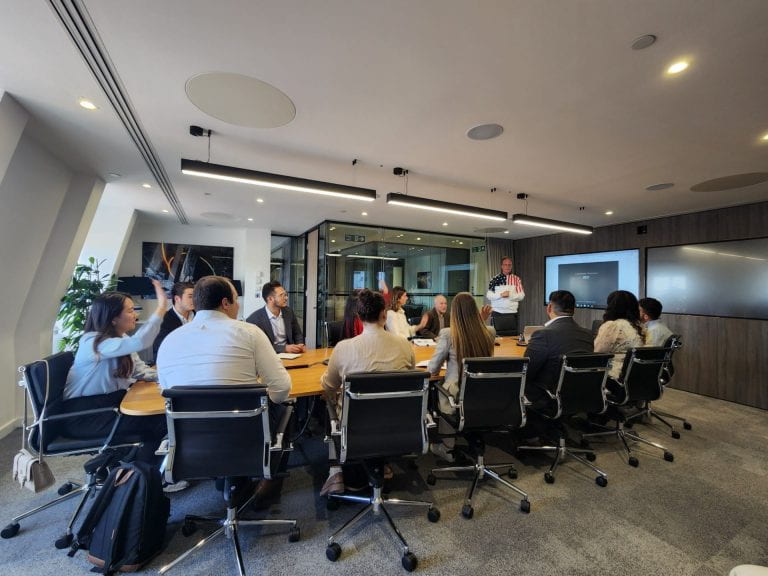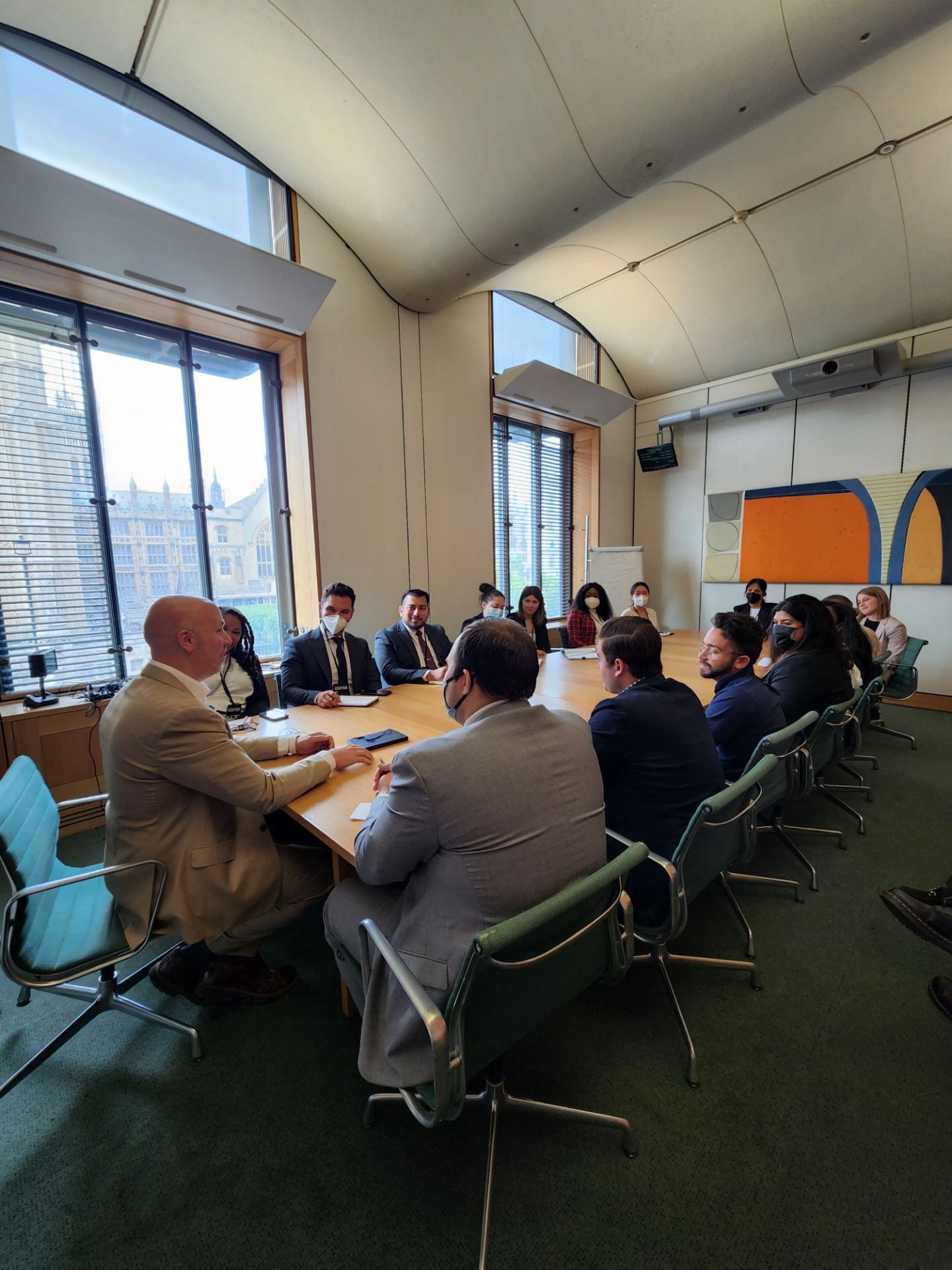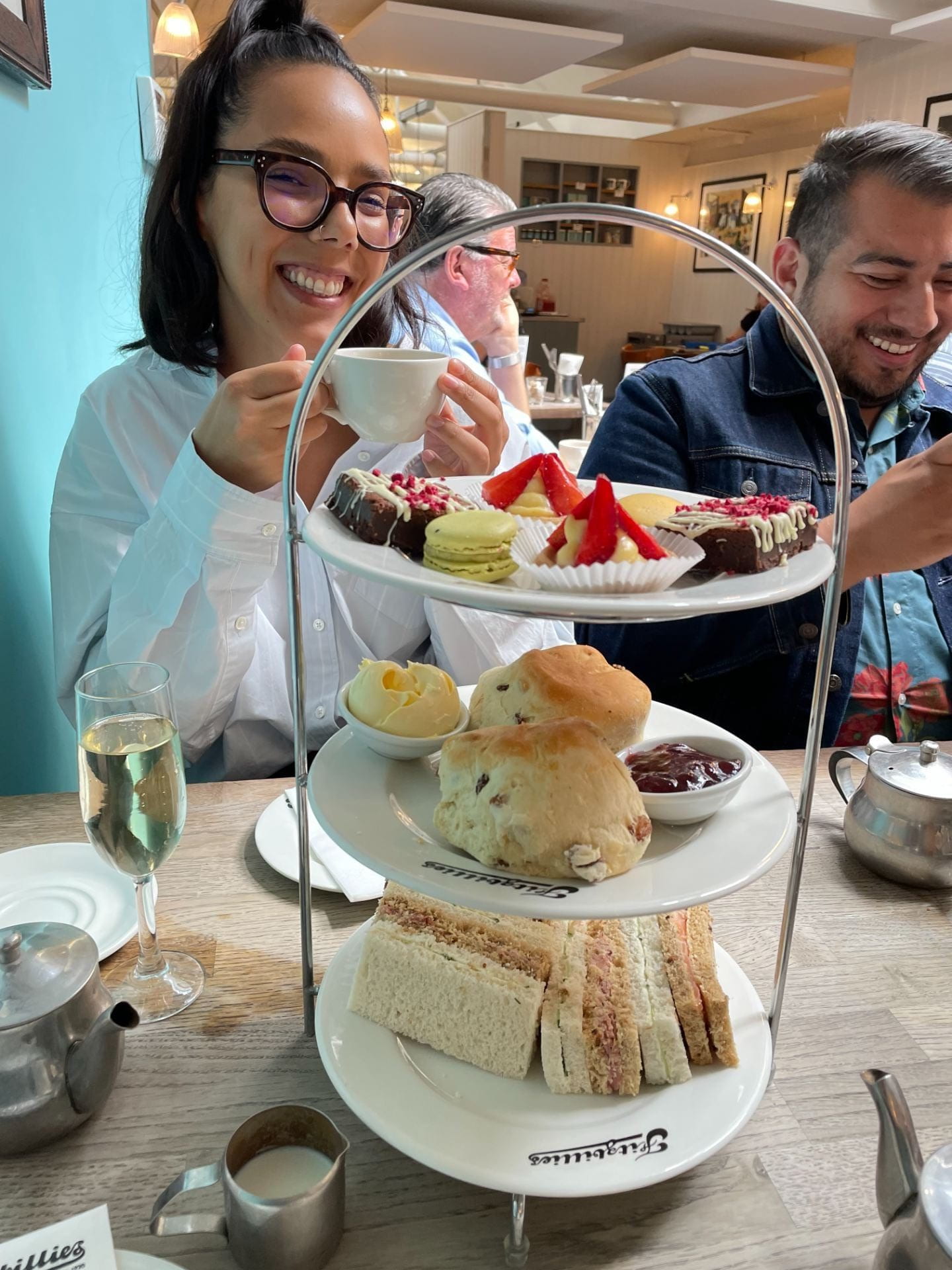Featured in the above photo: Lunch and conversation with Lord Neil Kinnock in the House of Lords Dining Room.
By Olivia Lacny (PMBA '23)
One of my biggest regrets from my undergraduate years is that I didn’t study abroad. My friends would come back from a semester in Paris, a summer in Valencia, or a month in Nicaragua with memories and a whole new world perspective that I envied. I knew at the time that my financial situation could not support an extended time abroad and I did not yet have the confidence to travel alone. Still, it bothered me that I hadn’t taken the opportunity to revel in the mélange of culture and academia. I made my peace with that fact, accepting that the time in my life for living abroad had passed.

Lunch at country inn in Winchester, author left foreground.
Having experienced graduate school in my late twenties, I knew that the lessons I gleaned from academia were more meaningful than when I was in my late teens/early twenties. I feel that having waited until grad school to “study abroad”, this sentiment holds true. The timing is right. I remember snickering at my friends who returned to America feeling “cultured” and “worldly”, as if 16 weeks in a different country could alter your world view. I understand it now. Just six days in the United Kingdom has changed my outlook on climate change, work-life balance, and the impact policy has on public health outcomes.
Most of this is due to the interactions that we had with the different spheres of expertise, but I would be remiss if I thought my classmates didn’t also play into this perspective shift. I thought that after this trip I would have gotten my “study abroad fix”, but I want to live an extended time abroad now more than ever. This is just the beginning and as a prepare to enter my thirties, I’m open to the opportunity of moving outside of the United States. Mortgage, dog, and homelife aside, this trip has taught me the importance of immersion in a different culture.
What I Learned from My Peers
This experience wouldn’t have altered my perspective, had it been a class of 20, like-minded MBA students. One of the most invaluable attributes of this course is that I was surrounded by people who chartered a different path in academia. I learned almost as much from the questions that others asked, as I learned from the keynote speakers. For instance, some of my classmates had an impressive background in environmental policy. Every time that they asked a question about climate policies, I would find myself amazed by their expertise in the field. I felt this with almost all my classmates from different programs. At dinner our first night, a couple of my classmates spent 25 minutes talking about the Jones Act as it relates to the Coast Guard and the supply chain. Did I have any clue what the Jones Act was? No, but I do now! The smaller, informal interactions with my peers proved to be as meaningful and informative as our formal interactions.
General Observations
Learnings from the trip fall into two categories: 1) dialogue and perspective from our speakers and 2) cultural aspects of living in the UK. To begin with the content of our speaker series, one of the most striking aspects of our dialogue was that regardless of industry, businesspeople and policy makers have made a conscious effort to incorporate sustainability into their strategy. The most surprising, was that however conservative Liam Fox is, he is actively aware of the consequences of climate change. Both sides of the aisle agree that this is a world crisis. This is a stark contrast from the American conservative parties who refuse to acknowledge the legitimacy of climate change.
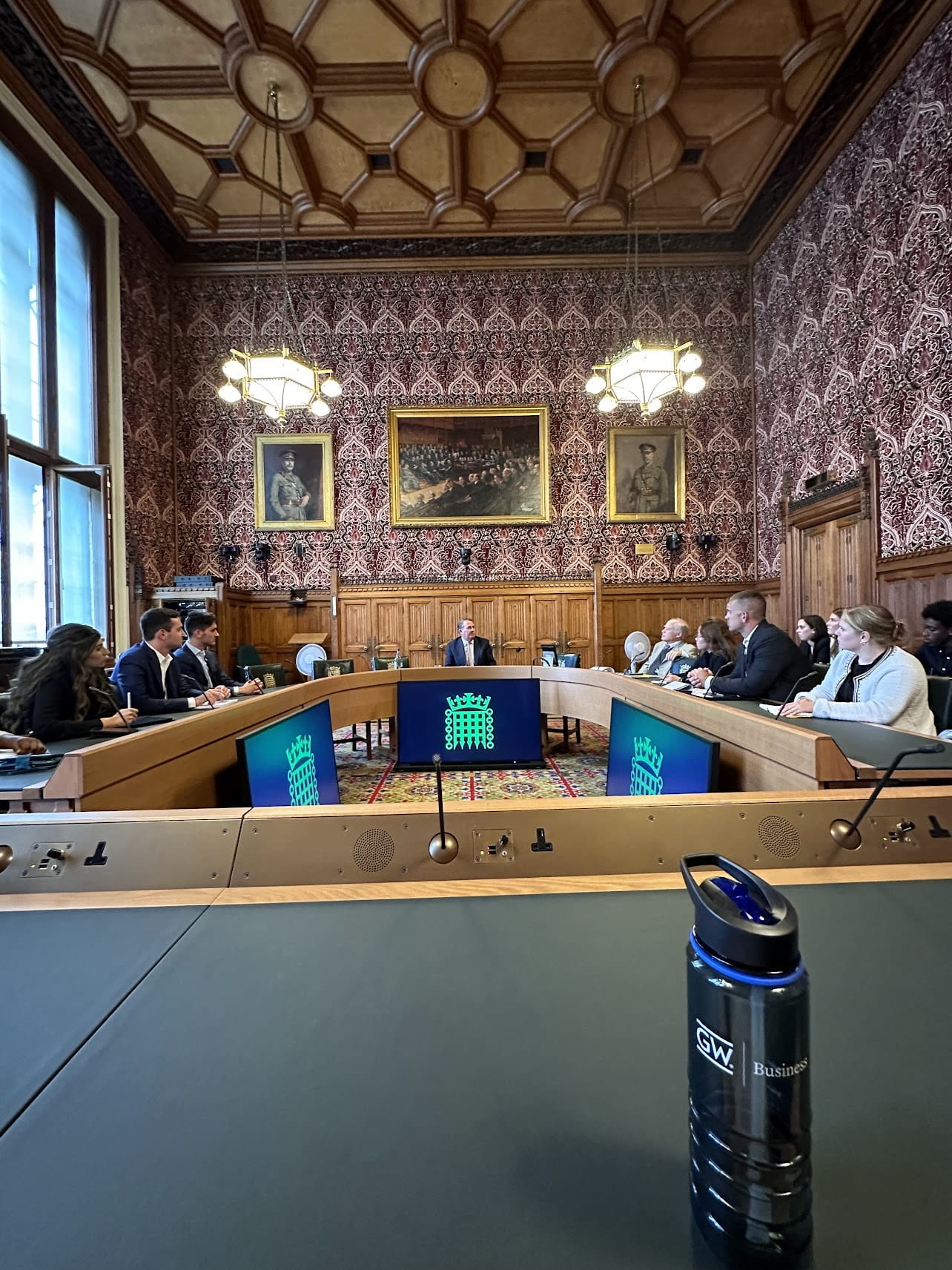
Liam Fox speaking with STAP UK participants.
Culturally, it’s obvious that Brits spend more time thinking about current international events compared to how often Americans think about global happenings. Could it be because Brexit was only a few years ago, and the fallout from leaving the EU has dominated the news ever since? Maybe. On the train a man and his son (who was probably around 7 or 8 years old) sat down across from me. The son asked a question that prompted his father to respond with his thoughts on the US’s national debt. The reverse situation would never happen in the US! I doubt American third graders are keen to discuss other countries’ national debt. This was also a theme of my conversations at the Alumni event. Expats explained how they spent their weekends and I realized how easy it is to immerse yourself in a dozen different cultures. You can easily take a weekend trip to Paris, Berlin, Madrid, Rome (the list goes on)- where the language, food, fashion, and traditions are all wildly different than London. In the US we have the option of traveling across the US or to Canada all of which are similar. Mexico is the only country within somewhat close proximity in which you can experience a different culture.
Core Memories
I’ve created so many wonderful memories, it’s hard to decide on my favorite part of the trip. I enjoyed seeing Winchester and its remarkable cathedral and Cambridge with its medieval charm. Never again in my life, will I have the opportunity to speak with MPs in the House of Commons, or dine with a real-life Lord. As much as I would love to do a graduate program abroad, I will probably never have another opportunity to study economics at Cambridge.

Global Head of Infrastructure, Government and Healthcare Richard Threlfall with UK STAP group at KPMG Headquarters, Canary Wharf.
My favorite speakers included MP Carolyn Harris and Richard Threlfall from KPMG. Both had a contagious enthusiasm for their work. As a consultant, I appreciated learning about consulting in a different industry. I loved Richard’s “primer” activity asking questions like “what would happen 6 years & 26 days from today?”. It felt like a game of trivia, which was a welcome change after a long day of meetings.
Carolyn Harris did not fit my perception of an MP. It was empowering to hear that someone with a working-class background and purple hair could become an MP, and that you don’t need to fit the classic mold of a “politician” in order to be one in the UK. This is different from politicians in the US, where it is almost impossible to become a representative without copious amounts of money and fashion conformity.
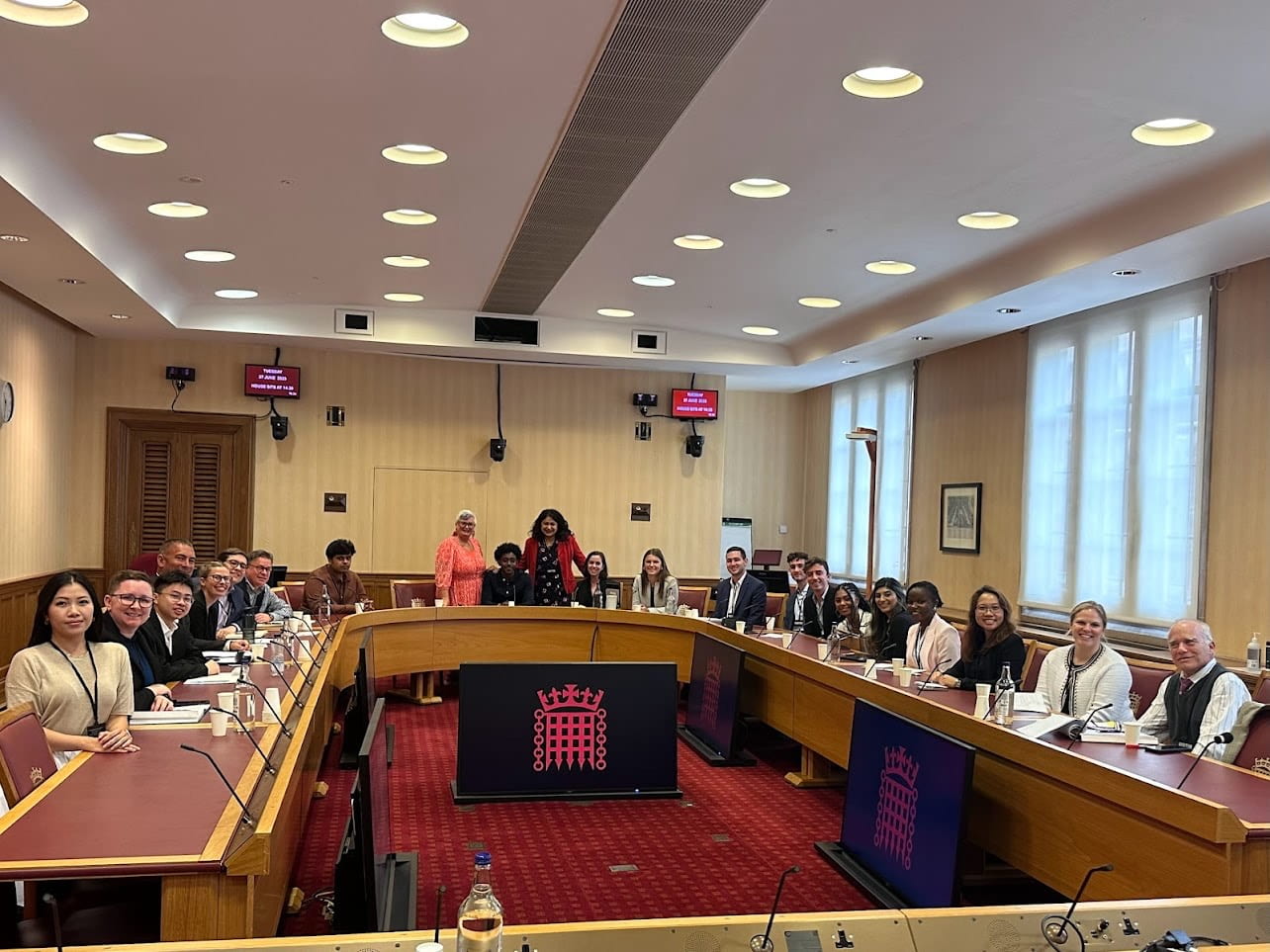
STAP UK 2023 participants in Parliament with MP Carolyn Harris and Councillor Aysha Raza
Carolyn spoke with such passion on the concept of women’s health and menopause, it reinvigorated the same passion that I once had while studying in undergrad. When Carolyn said that she would let us know when she was on Capitol Hill, I would ACTUALLY want to see her! She was a refreshing personality in a somewhat stuffy parliament building.
Conclusion
I am grateful to have had the opportunity to participate in this program. It exceeded my expectations and pushed me to learn and explore academic disciplines other than my own. The itinerary was perfectly organized and executed and with each new guest speaker I felt more excited. I used to poke fun at my friends who said study abroad “changed their life”, and while I’m the same person that I was before London, I will cherish the memories I created through this once-in-a-lifetime experience.

